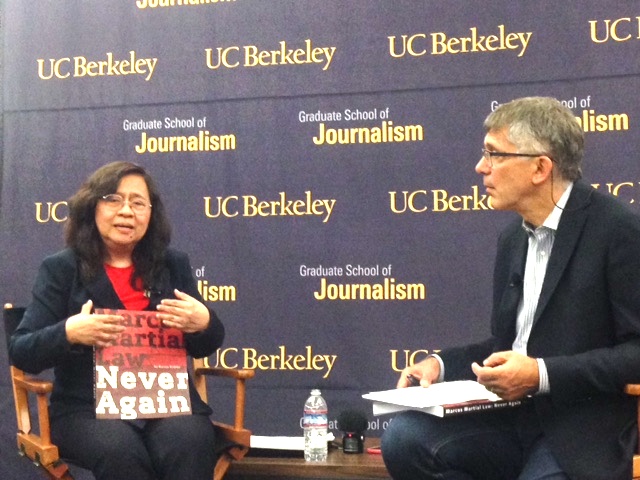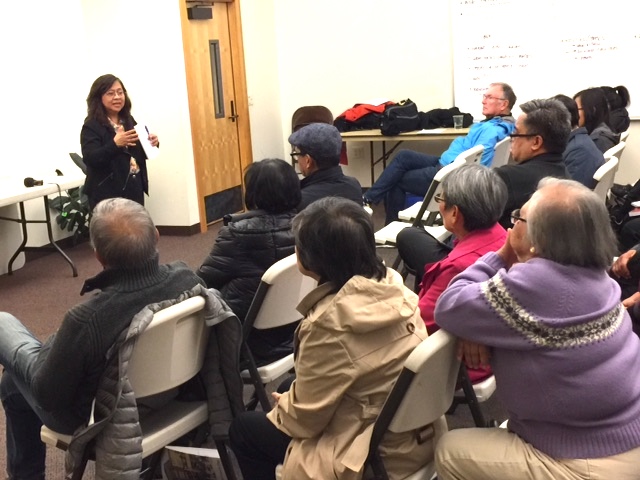Prestigious award caps Filipino journalist’s U.S book tour

At the University of California-Berkeley event “Living Dangerously: Investigative Reporting from Marcos to Duterte,” Raissa Robles, in conversation with John Temple, Pulitzer Prize-winning journalist and director of the Investigative Reporting Program at the Graduate School of Journalism. INQUIRER/Mila de Guzman
SAN FRANCISCO — Hardly had investigative journalist and blogger Raissa Robles recovered from her jet lag, after a month-long U.S. book tour, when she received the news that her publication Marcos Martial Law: Never Again had won the 2017 National Book Award for non-fiction prose in English.
The National Book Development Board and Manila Critics Circle jointly conduct the yearly selection of the best literary works in English, Tagalog and other native languages published in the Philippines. Robles’ book was also a finalist in the Book Design category.
Previously, the International Christian Organization for the Media (ICOM) in Geneva had honored Robles with the International Award for Excellence for Journalism for her tome on martial law. Published by Filipinos for a Better Philippines, a non-governmental organization, and released before the 2016 presidential election, Marcos Martial Law became an instant bestseller and is now on its third printing.
Robles, who is also the Manila senior correspondent for the South China Morning Post (Hongkong), decided to write a definitive account of the infamous period in Philippine history because she found out that there was none available. She says, “I was worried about the future of the present generation. Today’s young people know very little about the history of martial law and are being fed lies on social media. I was worried that they would believe the next Marcos-like figure and welcome another dictatorship.”

Well-attended Filipino community event featuring Raissa Robles at the Filipino Community Center in Seattle. CONTRIBUTED
She credits her husband, Alan Robles, who is also a blogger and served as editor of her award-winning book, with helping bring her project to fruition.
Enthusiastic reviews
Since its publication, Robles’ historical work has earned enthusiastic reviews worldwide.
Candy Quimpo-Gourlay, an author who has won recognition for her children’s books and was a journalist in Manila before she moved to the United Kingdom in 1989, describes the Marcos Martial Law as “a story of a nation betrayed – how the shiny New Society created by the Marcos dictatorship concealed a shocking theatre of terror and torture. Victims are interviewed, their alleged tortures questioned, allegations cross-checked, footnoted, appended. …The accounts are harrowing, many perpetrators are at large, and the martial law story clearly remains unfinished. This is an important book, not just for the victims whose voices deserve to be heard, but for the generations who deserve to know the truth. A stoic refusal to forget and a singular act of courage.”
Eminent historian Alfred McCoy, Harrington Professor of History at the University of Wisconsin-Madison, notes, “Just at the moment when the collective memory of Marcos’s brutality was fading and his partisans were recasting his martial law regime as a bold developmental initiative, Raissa Robles has delivered a powerful corrective…More than any other work published in the thirty years since the dictator’s downfall, this book inscribes all this evidence of the regime’s excesses in the historical record for future generations of Filipinos.”
Noelle Q. De Jesus, multi-award winning author of Blood: Collected Stories who has lived in Singapore for almost two decades, says, “What Raissa Robles, together with husband, Alan Robles, has done is focus unflinching eyes on this, still the darkest chapter of Philippine history, shining light into the deepest crevices of power hungry greed, violence and abuse. Marcos Martial Law: Never Again connects the dots for us, for the generations that do not know, but also for those who have chosen to forget. Her painstaking work here fills in the knowledge gaps of a still very troubled nation. It should be required reading for all Filipinos.”
Fitting forum
Robles’s much-acclaimed book found a fitting forum at last month’s Fourth Filipino American International Book Festival sponsored by the Philippine American Writers and Artists (PAWA). Held biennially, this year’s event carried the theme “Pamana: Creating Legacy,” honoring Filipino writers and artists around the world that create meaningful legacies for future generations. Robles was one of the featured speakers at the well-attended panel discussion called ““Filipino and Filipino American Women Writing Contemporary History.”

Joshua Paras, Skyline College student and PAWA organizer, urges young Fil-Ams to become more informed and involved about what’s happening in the Philippines. CONTRIBUTED
Upon hearing of the journalist’s planned visit, a group of former anti-Marcos dictatorship activists in the Bay Area offered to organize a speaking tour for Robles to five major U.S. cities (SF, Los Angeles, New York, Washington, D.C. and Seattle) that were the epicenters of the U.S. anti-martial law movement in the 1970s and 1980s.
Volunteers in those cities eagerly came forward and contributed for the airfare and other expenses, hosted Robles at their homes, introduced her to California and other cuisines, drove her to and from her talks and flights, and organized her events and other appointments.
“I knew I was speaking at the book fest and giving some talks but invitations started pouring in for me to speak before Filipino communities, schools, and other groups,” Robles explains. “Though it was my first visit to the U.S. and my first speaking tour, I felt up to the challenge.”
Whirlwind visit
And indeed, it turned out to be a whirlwind, one-month visit that tested Robles’s physical stamina. The number of her speaking engagements and her rigor in preparing for each talk left not much time for her to visit popular tourist sights. Her campus lecture circuit included some of the most prestigious universities in the country.
On the West Coast, Robles spoke at the University of California–Berkeley Graduate School of Journalism, University of San Francisco, University of California–Los Angeles, California State University in Fullerton and Los Angeles and Seattle Central College. On the East Coast, she gave talks at New York University; George Washington University and American University in Washington, D.C.
Carol Ojeda Kimbrough, a former professor in Asian American Studies at the California State University in Fullerton (CSUF) and one of the organizers of Robles’s Los Angeles tour, says that, “Robles’s assessment of the Duterte administration in the Philippines and the very real possibility of martial law once again being declared turned into a lively discussion when a student asked about ‘trolls and bots’ in social media. Several students shared their experiences with trolls and their negative messages. Robles gave the students some practical tips in dealing with these inflammatory, or offensive comments.” Ojeda-Kimbrough adds that at CSU-Los Angeles, the professor reported that “the students learned so much not only about the history, but also the current political situation in the Philippines.”
Dialogue with Fil-Ams
At Filipino community events, Robles had the opportunity to dialogue with multi-generational Filipino immigrants, which now comprise one of the largest foreign-born groups in the U.S. She states, “Fil-Ams played a key role during martial law, lobbying the U.S. government to drop support for Ferdinand Marcos. Since they continue to maintain ties with their relatives back home, I felt that it was important for me to try to reach my overseas compatriots and share what is happening in the Philippines and how martial law still affects Filipinos up to this day.”

Raissa Robles (sixth from left) with Fil-Am students, following her talk at Philippine Cultural Society of George Washington University in Washington, D.C. CONTRIBUTED
Robles’ packed itinerary also included talks at a book event at the Blessed Sacrament Church in L.A.; Asian American Writing Workshop, the Fil-Am Press Club, and AF3IRM, a transnational feminist organization, all in New York; and the World-Bank/IMF Fil-Am Association in Washington, D.C. In between these speaking engagements, she was interviewed by KALW, a public radio station based in San Francisco, and KCSB, aired by the University of California-Santa Barbara.
Most of Robles’s appearances were live streamed by supporters on Facebook and YouTube, allowing her to reach a much wider audience. Because of the popularity of her blog (https://raissarobles.com), which won the Best Society and Politics Blog in the 2015 Bloggys Award, and her powerful new book, she is not without detractors.
Attempted disruptions
Duterte and Marcos supporters tried to disrupt her talks at UCLA, Fil-Am Press Club of New York, and New York University. Though Robles tried to conduct a reasoned dialogue with them, their mantra was that Robles was “lying,” without offering any substantive arguments to back up the charge, and then using this narrative for videos of Robles’ appearances they posted on YouTube.
For this reason, Robles allotted time in most of her talks to emphasize the need for vigilance in discerning fake news from the truth. She advises, “Because the Internet has become the medium for spreading fake news, be your own editor and check primary sources, and choose websites you can trust. Also, certain trolls splice videos so the message comes out differently. Find the lengthier video from the real source.”
In her book, Robles mentions how the Marcos dictatorship exported martial law abroad and cited the murders of Silme Domingo and Gene Viernes, anti-Marcos and union activists and both members of KDP, by Marcos gunmen on June 1, 1981 in Seattle. Thirty-six years later, during her Seattle visit, she met with members of the family of Silme Domingo. His sister Cindy Domingo led the Committee for Justice for Domingo and Viernes (CJDV) for almost a decade and is co-editor of the newly released A Time to Rise: Collective Memoirs of the Union of Democratic Filipinos (KDP).
Domingo states, “Raissa’s talks were a reminder of the tyranny of the Marcos dictatorship that led to the deaths of Silme and Gene and thousands of other Filipinos who died and were tortured. But even more important was her warning that the Philippines under Duterte could be headed toward another authoritarian regime. That means our organizing in the U.S. could take on a new significance in once again overthrowing another dictator.”
Meeting key lawyer
Besides meeting the organizers of the CJDV, she also got to know Mike Withey, the lead attorney in the civil lawsuit on the assassinations, which found the Marcoses guilty of an overt act of conspiracy that resulted in the deaths of the two activists.
The trial and verdict made history by putting a former head of a foreign government on trial for the murders of U.S. citizens in a U.S. court and finding him liable. Withey, who is the author of the upcoming book Summary Execution:The Political Assassinations of Silme Domingo and Gene Viernes, calls Robles’s book a “monumental achievement” and adds, “she richly deserves the honor.”
Jon Melegrito, a former KDP activist and longtime community leader in Washington, D.C. who has worked for years to lobby U.S. Congress for the recognition of Filipino veterans who fought in World War Two, echoes Withey’s sentiment.

On October 20, Robles was featured speaker at forum on “Martial Law and the Reemergence of Authoritarianism in the Philippines,” sponsored by the Fil-Am Press Club of New York at San Damiano Hall, Church of Saint Francis of Assissi in Manhattan. CONTRIBUTED
Melegrito, who arranged Robles’s talks at George Washington University and American University, states, “Raissa’s talks were absolutely much needed to challenge the prevailing support for Duterte in the community, which is only getting one side of the story. Raissa connected well with both students and faculty, and all her books sold out. She is definitely a fearless, articulate, and knowledgeable journalist and speaker.”
Avid response
The avid response of members of the Filipino community and non-Filipinos of different backgrounds to her talks have left a lasting impression on Robles, who was on her first visit to the U.S.
“Although I did not have time to see more of the cities I visited, I realized that I have been privileged to meet Fil-Am communities and speak at renowned universities. I am thankful to former anti-dictatorship activists who were able to arrange my speaking tour in five major cities,” she states.
“Everywhere I went I was met with generosity, cheerfulness and enthusiasm, except for attempts at distraction by a few trolls. After my talks, people would come to me and say that they appreciated my insight and learned from my presentation. This has been an enriching experience that will surely help my writing. Despite the hectic schedule, it was all worth it!”
Joshua Paras, a student at Skyline Community College in English and Ethnic Studies who was one of the organizers of the recent PAWA book fest, sums up his experience from attending Robles’s Filipino community event in San Francisco.
“I think Raissa Robles was right in assuming young people don’t know much about martial law and Marcos. Initially, I had only a vague idea about martial law. I’d always heard that the Philippine government had a history of corruption and abuse, but beyond those ambiguous words I didn’t know much.
“After Raissa’s talk, I felt much more informed about Duterte’s regime, the ways they are abusing power, the history of martial law in the Philippines, and the current state of Philippine politics. For example, I learned that many of Duterte’s supporters are working diligently on social media to undermine people’s confidence in democracy by exaggerating the communist and drug threats in the Philippines.
“I think that it is absolutely important that the Fil-Am community keep together on these issues and for young people to get involved. Even if many of us immigrants no longer live in the Philippines, we still have family and relatives there who are being affected by the current government policies. The younger generation must not become apathetic to what’s happening to our families across the sea.”
Note: Robles’s “Marcos Martial Law: Never Again” is available at Arkipelago Book Store, 1010 Mission Street, San Francisco, CA 94103, 415-795-3382, www.arkipelagobooks.com.

